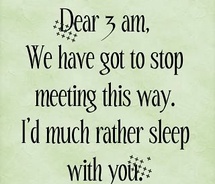dear 3 a.m.

Insomnia becomes more common with age. As you get older, changes can occur that may affect your sleep. You may experience:
- A change in sleep patterns. Sleep often becomes less restful as you age, and you may find that noise or other changes in your environment are more likely to wake you as you get older. With age, your internal clock often advances, which means you get tired earlier in the evening and wake up earlier in the morning. But older people generally still need the same amount of sleep as younger people do.
- A change in activity. You may be less physically or socially active. Activity helps promote a good night’s sleep. You may also be more likely to take a daily nap, which also can interfere with sleep at night.
- A change in health.The chronic pain of conditions such as arthritis or back problems as well as depression, anxiety and stress can interfere with sleep. Older men often develop noncancerous enlargement of the prostate gland (benign prostatic hyperplasia), which can cause the need to urinate frequently, interrupting sleep. In women, hot flashes that accompany menopause can be equally disruptive.Other sleep-related disorders, such as sleep apnea and restless legs syndrome, also become more common with age. Sleep apnea causes you to stop breathing periodically throughout the night. Restless legs syndrome causes unpleasant sensations in your legs and an almost irresistible desire to move them, which may prevent you from falling asleep.
- Increased use of medications. Older people use more prescription drugs than younger people do, which increases the chance of insomnia caused by a medication.
source: Mayo Clinic




It’s a lifelong malady. Once I had my first child I never slept through the night again. I get a lot done during those wakeful hours, since I don’t just lie there. However, I seem to always be tired.
I agree, Suzy – it is a lifelong malady – but there are certainly worse things; I shouldn’t complain!